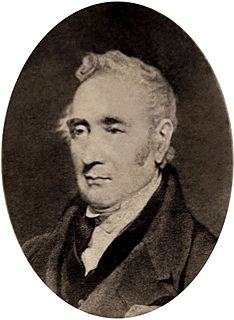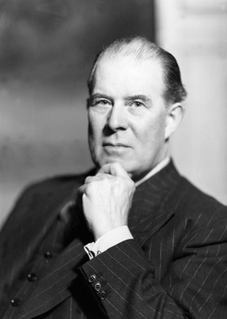A Quote by Lord Byron
This is the patent-age of new inventions For killing bodies, and for saving souls, All propagated with the best intentions; Sir Humphrey Davy's lantern, by which coals Are safely mined for in the mode he mentions, Tombuctoo travels, voyages to the Poles, Are ways to benefit mankind, as true, Perhaps, as shooting them at Waterloo.
Related Quotes
For the pre-Darwinian age had come to be regarded as a Dark Age in which men still believed that the book of Genesis was a standard scientific treatise, and that the only additions to it were Galileo'a demonstration of Leonardo da Vinci's simple remark that the earth is a moon of the sun, Sir Humphrey Davy's invention of the safety lamp, the discovery of electricity, the application of steam to industrial purposes, and the penny post.
All that we "know" is what registers on our brains, so what you perceive (your individual reality-tunnel) is made up of nothing but thoughts—as Sir Humphrey Davy noted when self-experimenting with nitrous oxide in 1819, and as Buddha noticed by sitting alone until all his social imprints atrophied and dropped away.
The majority, being satisfied with the ways of mankind as they now are (for it is they who make them what they are), cannot comprehend why those ways should not be good enough for everybody; and what is more, spontaneity forms no part of the ideal of the majority of moral and social reformers, but is rather looked on with jealousy, as a troublesome and perhaps rebellious obstruction to the general acceptance of what these reformers, in their own judgment, think would be best for mankind.
I came from a tradition where souls were a theological reality, not a faith reality. Souls were for saving, not for communing. Souls were for converting and, once they were converted, they were to be left alone. Souls were too mystical, too subjective, too ambiguous, too risky, too... well, you know - New Age-ish.
The mentality of mankind and the language of mankind created each other. If we like to assume the rise of language as a given fact, then it is not going too far to say that the souls of men are the gift from language to mankind. The account of the sixth day should be written: He gave them speech, and they became souls.
White supremacist ideology is based first and foremost on the degradation of black bodies in order to control them. One of the best ways to instill fear in people is to terrorize them. Yet this fear is best sustained by convincing them that their bodies are ugly, their intellect is inherently underdeveloped, their culture is less civilized, and their future warrants less concern than that of other peoples.
Although human ingenuity may devise various inventions which, by the help of various instruments, answer to one and the same purpose, yet will it never discover any inventions more beautiful, more simple or more practical than those of nature, because in her inventions there is nothing lacking and nothing superfluous; and she makes use of no counterpoise when she constructs the limbs of animals in such a way as to correspond to the motion of their bodies, but she puts into them the soul of the body.
Truth, like beauty, varies its fashions, and is best recommended by different dresses to different minds; and he that recalls the attention of mankind to any part of learning which time has left behind it, may be truly said to advance the literatures of his own age. As the manners of nations vary, new topicks of persuasion become necessary, and new combinations of imagery are produced; and he that can accommodate himself to the reigning taste, may always have readers who perhaps would not have looked upon better performances.






































